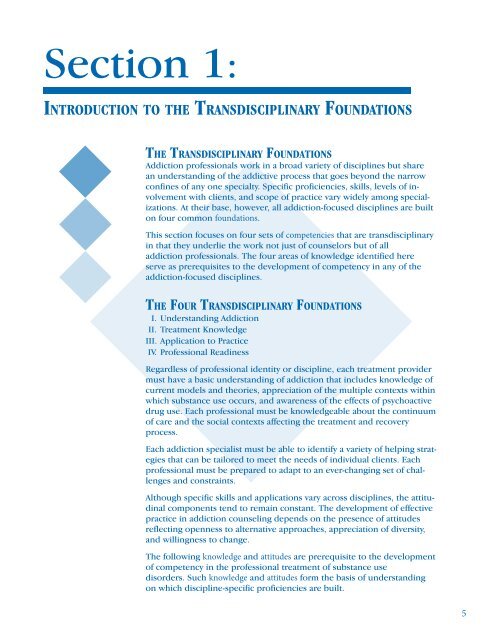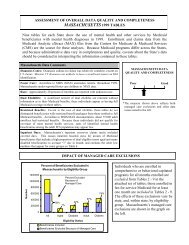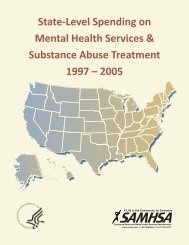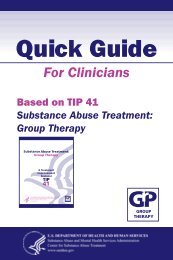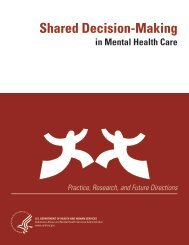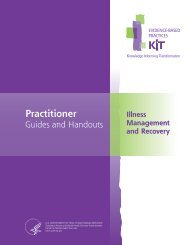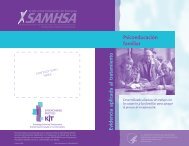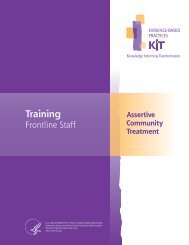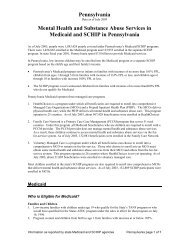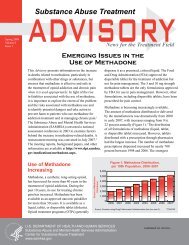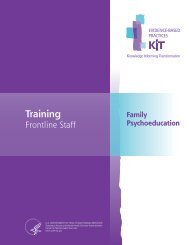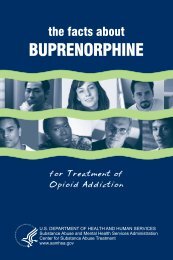TAP 21 - SAMHSA Store - Substance Abuse and Mental Health ...
TAP 21 - SAMHSA Store - Substance Abuse and Mental Health ...
TAP 21 - SAMHSA Store - Substance Abuse and Mental Health ...
Create successful ePaper yourself
Turn your PDF publications into a flip-book with our unique Google optimized e-Paper software.
Section 1:<br />
Introduction to the Transdisciplinary Foundations<br />
The Transdisciplinary Foundations<br />
Addiction professionals work in a broad variety of disciplines but share<br />
an underst<strong>and</strong>ing of the addictive process that goes beyond the narrow<br />
confines of any one specialty. Specific proficiencies, skills, levels of involvement<br />
with clients, <strong>and</strong> scope of practice vary widely among specializations.<br />
At their base, however, all addiction-focused disciplines are built<br />
on four common foundations.<br />
This section focuses on four sets of competencies that are transdisciplinary<br />
in that they underlie the work not just of counselors but of all<br />
addiction professionals. The four areas of knowledge identified here<br />
serve as prerequisites to the development of competency in any of the<br />
addiction-focused disciplines.<br />
The Four Transdisciplinary Foundations<br />
I. Underst<strong>and</strong>ing Addiction<br />
II. Treatment Knowledge<br />
III. Application to Practice<br />
IV. Professional Readiness<br />
Regardless of professional identity or discipline, each treatment provider<br />
must have a basic underst<strong>and</strong>ing of addiction that includes knowledge of<br />
current models <strong>and</strong> theories, appreciation of the multiple contexts within<br />
which substance use occurs, <strong>and</strong> awareness of the effects of psychoactive<br />
drug use. Each professional must be knowledgeable about the continuum<br />
of care <strong>and</strong> the social contexts affecting the treatment <strong>and</strong> recovery<br />
process.<br />
Each addiction specialist must be able to identify a variety of helping strategies<br />
that can be tailored to meet the needs of individual clients. Each<br />
professional must be prepared to adapt to an ever-changing set of challenges<br />
<strong>and</strong> constraints.<br />
Although specific skills <strong>and</strong> applications vary across disciplines, the attitudinal<br />
components tend to remain constant. The development of effective<br />
practice in addiction counseling depends on the presence of attitudes<br />
reflecting openness to alternative approaches, appreciation of diversity,<br />
<strong>and</strong> willingness to change.<br />
The following knowledge <strong>and</strong> attitudes are prerequisite to the development<br />
of competency in the professional treatment of substance use<br />
disorders. Such knowledge <strong>and</strong> attitudes form the basis of underst<strong>and</strong>ing<br />
on which discipline-specific proficiencies are built.<br />
5


